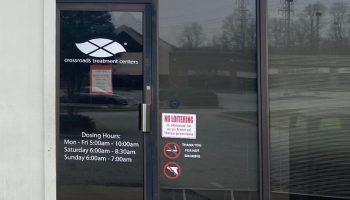
About Silver Ridge
Located in Mills River, North Carolina, Silver Ridge is a luxury addiction and mental health treatment center. Programs offered at the facility include inpatient and outpatient programs, including inpatient detoxification in Asheville.
The organization is in network with BlueCross/BlueShield and Aetna insurance providers. They also accept out of network insurance and military insurance, such as TRICARE. Medicare and Medicaid are not accepted.
A Luxury Addiction Treatment Experience in North Carolina
The residential treatment center is a 10,000 square foot estate in a peaceful and private setting in the heart of the Blue Ridge Mountains near Asheville. There are 15 beds in eight spacious rooms, and the estate offers beautiful mountain views. The program begins with detox, if appropriate.
Your days begin with a healthy breakfast designed to restore nutritional deficiencies, there are morning classes of yoga or meditation. The practices help relieve stress and prepare you for the coming day. You’ll then attend group therapy sessions, after which you’ll have a healthy lunch.
An Afternoon of Holistic Therapy Treatments
You’ll engage in intensive therapy sessions after lunch and participate in relapse prevention planning. The afternoon provides opportunities for holistic alternative therapies, such as art, music, dance, or equine assisted therapy. Other therapies include biofeedback, neurofeedback, exercise programs, and acupuncture.
Since addiction affects the entire family, you’ll have the opportunity for family therapy where you can address your relationships and work through complex emotions relating to family dynamics.
A nutritious dinner, evening activities, and a 12 step program may mark the end of the day. You’ll be encouraged to keep a regular sleep schedule to enhance your treatment program.
A Welcoming Environment
The treatment team welcomes everyone from transitional age young adults to midlife adults and seniors. They have experience with LGBTQ+ clients and their unique needs, as well as those with HIV or AIDS, veterans, and active duty military members. They specialize in treating clients with co-occurring mental health disorders.
Clients are enthusiastic about the program. One client mentioned that this place “changed my life and I will be forever grateful.”
| Levels of Care | Detox Service Setting | Programs | Payment Options | ||
|---|---|---|---|---|---|
|
Inpatient and residential programs provide round-the-clock medical and emotional support as you live at the treatment facility. This level of care may be recommended if you have severe addictions or mental health conditions since it removes outside distractions and allows you to focus solely on therapy. |
Dual diagnosis programs address substance use disorders and co-occurring mental health conditions simultaneously. This integrated approach to care improves the likelihood of long term recovery and stability by addressing the root causes of addiction. |
||||
|
Inpatient detox occurs in a dedicated treatment facility. You’ll live there around the clock and receive intensive medical support and supervision to help manage your withdrawal symptoms. It is suitable for individuals with moderate to severe addictions as it ensures a stable detox environment. |
|||||
|
Adult programs address the substance use and life challenges specific to adults. Therapists can deliver sessions in individual, group and family settings. Services often include job support and life skills training in a structured environment. |
Alcohol detox programs offer medical support to help individuals withdraw safely from alcohol. Your care team may use medications to ease your symptoms and provide medical monitoring to address complications. |
Cognitive behavioral therapy focuses on changing harmful thought patterns and behaviors associated with addiction. You’ll learn healthier coping mechanisms by identifying and replacing negative thoughts. This improves your emotional resilience and decreases your relapse potential. |
Men's programs address substance use while also considering the social pressures, family roles and mental health concerns that are specific to men. You’ll learn healthy coping mechanisms as you build emotional resilience and develop communication skills. |
Opioid detox uses medications to ease severe withdrawal symptoms. It also includes medical supervision to help you manage potential complications. These services allow you to stabilize and begin a recovery plan. |
Women's programs offer a safe and supportive space to focus on gender specific issues such as trauma, family roles and mental health conditions. Therapists tailor the sessions to address women's needs and foster empowerment in a healing and nurturing environment. |
|
Private Insurance
|
Self Pay
|
Levels of Care
Inpatient and residential programs provide round-the-clock medical and emotional support as you live at the treatment facility. This level of care may be recommended if you have severe addictions or mental health conditions since it removes outside distractions and allows you to focus solely on therapy.
Dual diagnosis programs address substance use disorders and co-occurring mental health conditions simultaneously. This integrated approach to care improves the likelihood of long term recovery and stability by addressing the root causes of addiction.
Detox Service Setting
Inpatient detox occurs in a dedicated treatment facility. You’ll live there around the clock and receive intensive medical support and supervision to help manage your withdrawal symptoms. It is suitable for individuals with moderate to severe addictions as it ensures a stable detox environment.
Programs
Adult programs address the substance use and life challenges specific to adults. Therapists can deliver sessions in individual, group and family settings. Services often include job support and life skills training in a structured environment.
Alcohol detox programs offer medical support to help individuals withdraw safely from alcohol. Your care team may use medications to ease your symptoms and provide medical monitoring to address complications.
Cognitive behavioral therapy focuses on changing harmful thought patterns and behaviors associated with addiction. You’ll learn healthier coping mechanisms by identifying and replacing negative thoughts. This improves your emotional resilience and decreases your relapse potential.
Men's programs address substance use while also considering the social pressures, family roles and mental health concerns that are specific to men. You’ll learn healthy coping mechanisms as you build emotional resilience and develop communication skills.
Opioid detox uses medications to ease severe withdrawal symptoms. It also includes medical supervision to help you manage potential complications. These services allow you to stabilize and begin a recovery plan.
Women's programs offer a safe and supportive space to focus on gender specific issues such as trauma, family roles and mental health conditions. Therapists tailor the sessions to address women's needs and foster empowerment in a healing and nurturing environment.
Amenities
Accreditations
Contact

Susan is a freelance writer and photographer who loves writing from home with her dog, Jack Bauer, at her feet. Having transcribed patient charts in a mental health and addiction treatment hospital, she’s well informed on the subject of substance use and co-occurring disorder treatment. She’s experienced in content creation and writes her own photography blog and newsletter.

Peter W.Y. Lee is a historian with a focus in American Cold War culture. He has examined how popular culture has served as a coping mechanism for the challenges and changes impacting American society throughout the twentieth century.




